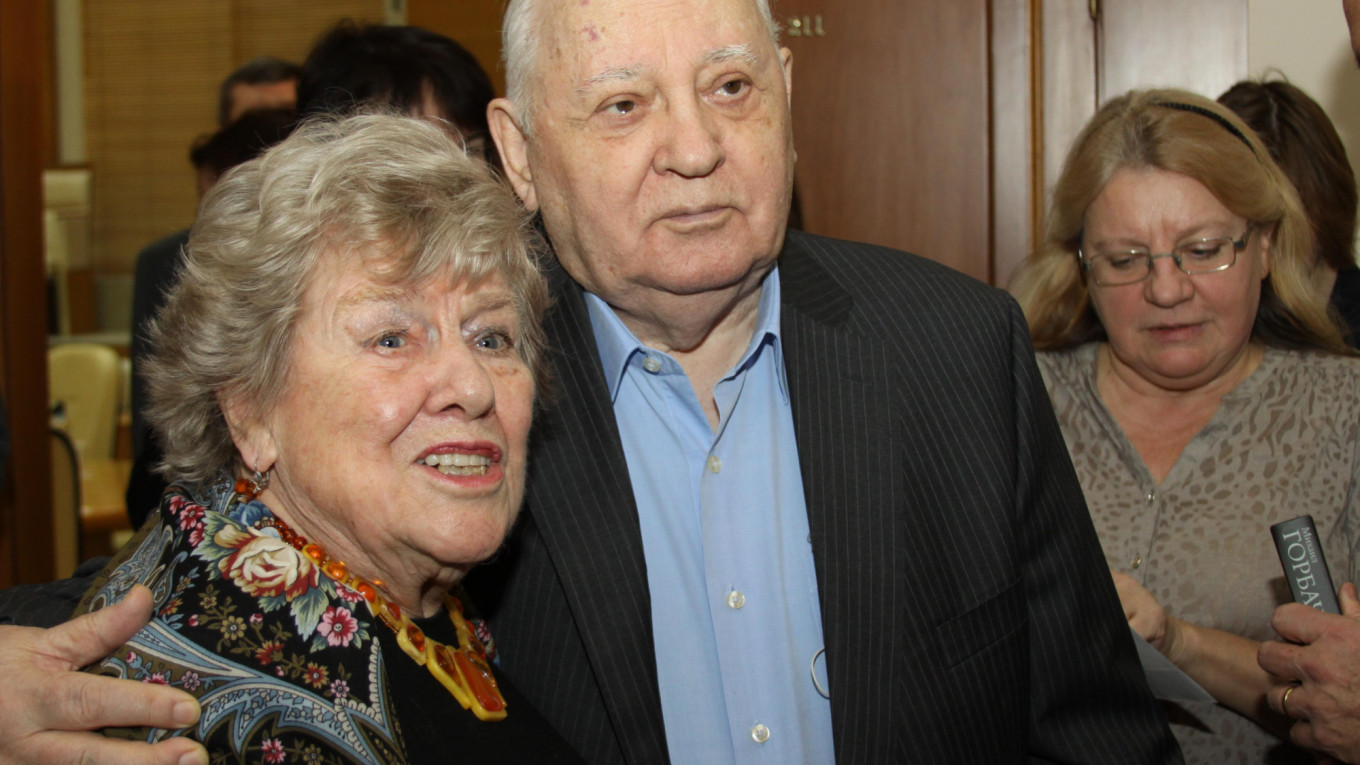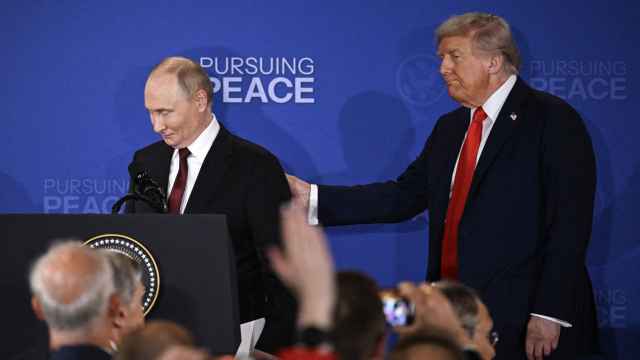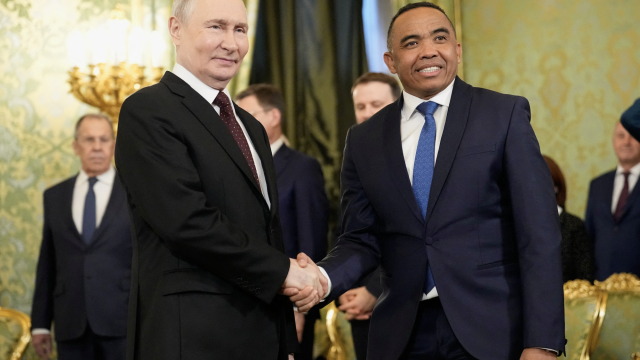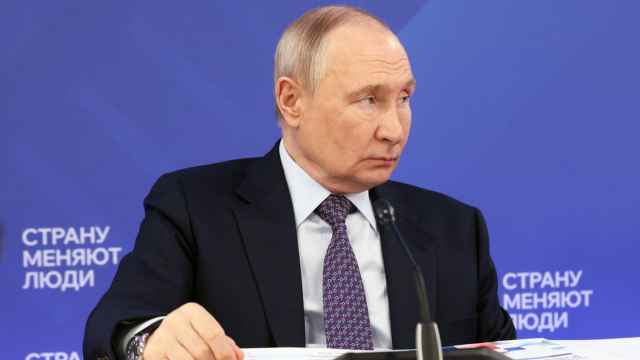Tuesday’s event at the Gorbachev Foundation was supposed to be a typically mundane book launch.
But the presentation of the Russian language version of Suzanne Massie’s “Trust But Verify: Russian Lessons for Reagan” turned out to be an unofficial meeting of the multi-generational club of peace-makers and optimists.
Ronald Reagan and the Land of the Firebird
Massie, 86, came from her home in Maine to attend the presentation of her memoir, which details her role as a private-citizen diplomat at the end of the Cold War. Published in English in 2013, the book tells the fascinating story of how her convictions and persistence got her into the Oval Office in 1984 to present her views about the Russian people to then President Ronald Reagan. He invited her back 20 more times through 1988. Her tutelage was influential in the Reagans’ burgeoning relationship with Mikhail and Raisa Gorbachev.
The daughter of a Swiss diplomat, Massie grew up in the United States. She stumbled on to her passion for Russia thanks to the search by her and her then husband, Robert Massie, for an approach to their son’s hemophilia. The result was the best-selling book, “Nicholas and Alexandra” – the history of the Romanov family and its demise. She went on to write more books about Russia, including the best-selling “Land of the Firebird,” which Reagan read.
Trust But Verify
The hallway overflowed on Tuesday not only with the plaques, awards and mementos that Gorbachev received over the years, but also with an eclectic and powerful group of well-wishers and Massie fans. They include venerable statesmen instrumental in bringing about the end of the Cold War, as well as representatives of a new generation of businessmen and officials concerned about the status of relations between Russia and the West.
After an introduction by Oleg Zimarin, the general director of Vesmir Publishing, which published the book, Gorbachev took the floor. The first and last president of the USSR, who is also 86, has been friends with Massie for many years. He spoke about nuclear disarmament, the work done to achieve it, and his own legacy. "We are not going to allow it. Those sitting here worked too hard... I don't want to be remembered after my death as someone who let people down."
Gorbachev pointed to retired Major General Vladimir Dvorkin, 81, and expressed his thanks for the general’s historic role in arms control. Dvorkin, who is now an expert in strategic weapons at the Carnegie Endowment for International Peace, helped shape the Soviet Union’s strategy towards disarmament. He lamented the current state of geopolitical affairs. “Now, there are no giants in the world,” Dvorkin said. “Even dwarfs standing on the shoulders of giants should be able to see further, but now it seems they don’t see much of anything.”
But, Dvorkin added, perhaps something will come of the bilateral meeting in Geneva later this month that will try to resolve disagreements about the Intermediate Range Nuclear Forces treaty.
Another veteran diplomat in attendance was Alexander Bessmertnykh, 84, who served in various roles for more than two decades in the 70s and 80s, including foreign minister and ambassador to the United States. Speaking about the state of relations between the US and Russia, Bessmertnykh said, “There are always ups and downs. A lot depends on a country’s internal situation. Right now, in the U.S., internal problems seem to be affecting external relations. The military industrial complex in both countries plays a role. The situation we are in is so unexpected. But we’ll find a way out.”
Despite frustration at the current state of affairs, Gorbachev is ever hopeful, as evidence by the title of his latest memoir, which came out in October: “I Remain an Optimist.” From his closing comments, it is clear Gorbachev is satisfied with his contribution. And he pointed out that there were younger members of the audience ready to “take the baton” and work towards peace.
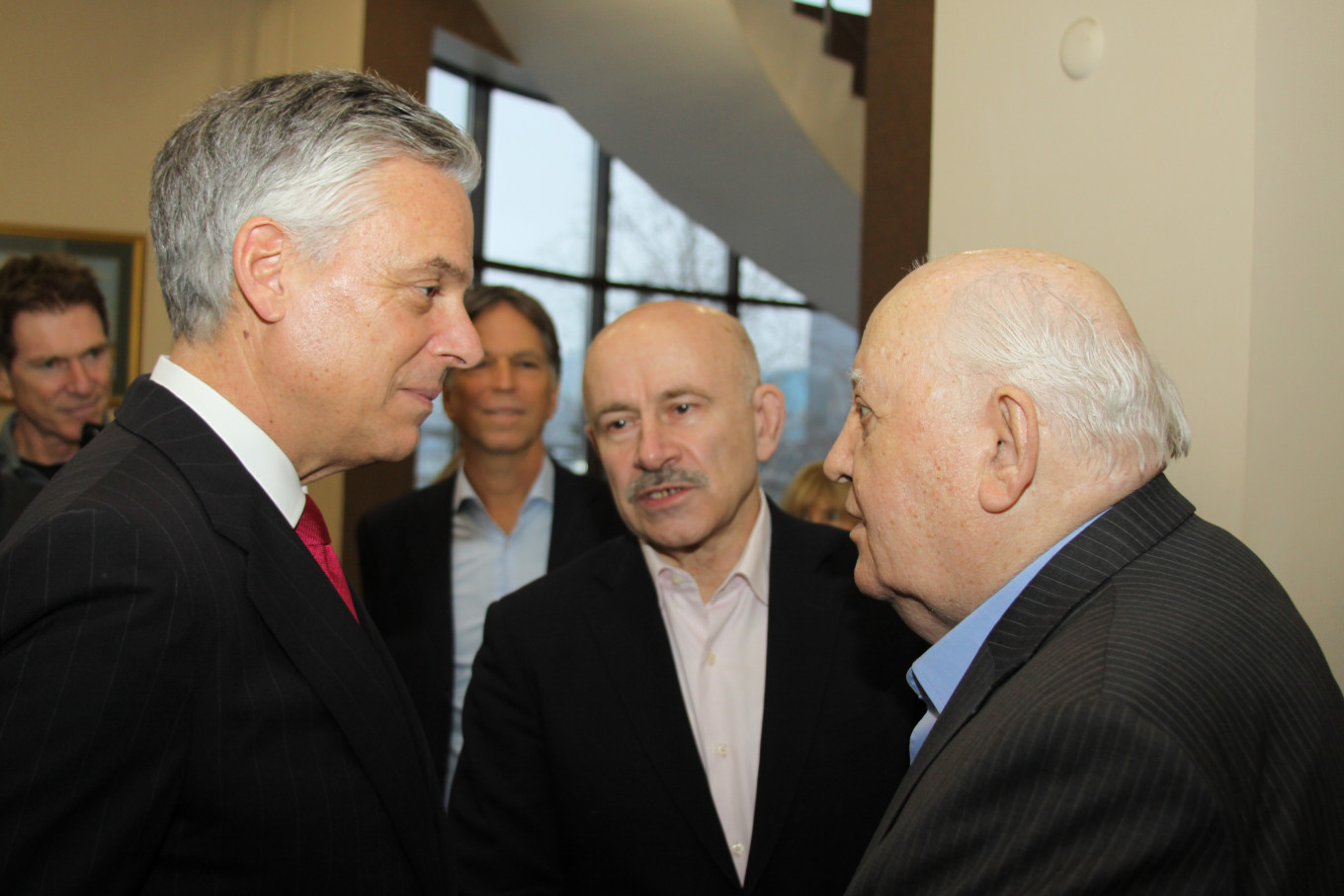
A New Generation
The path to the Russian publication of Massie’s book evidences that hope. A youthful, blond-haired Latvian parliamentarian named Sergejs Potapkins linked Massie to a Russian businessman named Ivan Polyakov during last year’s Baltic Forum. Polyakov found her story so important and timely that he agreed to provide financial support for the publication of the Russian edition.
“As a businessman, I’m naturally interested in maximizing peace, prosperity and order,” said Polyakov. “This book is a textbook on how to solve problems during a crisis. It is an effective mechanism for bringing people together. Russia and the United States share a huge responsibility for the future of the world.”
Although U.S. Ambassador to Moscow John Huntsman looks young, he traded grandchildren tales with Massie, prior to the start of the presentation. He is also a fan of her work.
“The book is a great contribution to better understanding the U.S.-Russia relationship,” Huntsman told The Moscow Times. “It goes back to the earliest days of its transformation from a competitive and challenging relationship to one more based on mutual respect and trust. Those are lessons we could learn today. Private citizens can play a role, just as Suzanne did.”
Another unexpected figure at the event was Rostislav Ordovsky-Tanaevsky Blanco. Rostik, as he is called, is not only a pioneer of restaurant franchising in Russia, but a respected member of the diaspora of White Russians – those who emigrated at the time of the 1917 revolution. He financed translations of Massie’s earlier works. “Her books about the tsars are staples of the community,” Rostik said. “We all read them when we were growing up.”
Despite her stoop and slow gait, Massie’s impish smile and tangible tenacity can convince anyone to subscribe to her mantra: one person can change the world, and everyone of us should try.
Her passion for fomenting a better understanding between the people of the United States and Russia is her overarching theme. “Together we can help the world,” said Massie. “Keeping us apart only helps the devil. We need to show each other the best of ourselves, and that’s what I’m trying to do.”
She maintains that the American people are very fond of Russians, despite the capricious nature of the relationship. “Russia is never predictable,” said Massie. “It reserves for itself surprises. That’s why I always say, Russia is a woman, and she is delightful.”
The affection between Gorbachev and Massie was palpable. At the reception following the presentation, he refused to take his seat until she did. “After all,” he said, “I’m a man from the Caucuses, and she is three months my senior.”
A Message from The Moscow Times:
Dear readers,
We are facing unprecedented challenges. Russia's Prosecutor General's Office has designated The Moscow Times as an "undesirable" organization, criminalizing our work and putting our staff at risk of prosecution. This follows our earlier unjust labeling as a "foreign agent."
These actions are direct attempts to silence independent journalism in Russia. The authorities claim our work "discredits the decisions of the Russian leadership." We see things differently: we strive to provide accurate, unbiased reporting on Russia.
We, the journalists of The Moscow Times, refuse to be silenced. But to continue our work, we need your help.
Your support, no matter how small, makes a world of difference. If you can, please support us monthly starting from just $2. It's quick to set up, and every contribution makes a significant impact.
By supporting The Moscow Times, you're defending open, independent journalism in the face of repression. Thank you for standing with us.
Remind me later.



